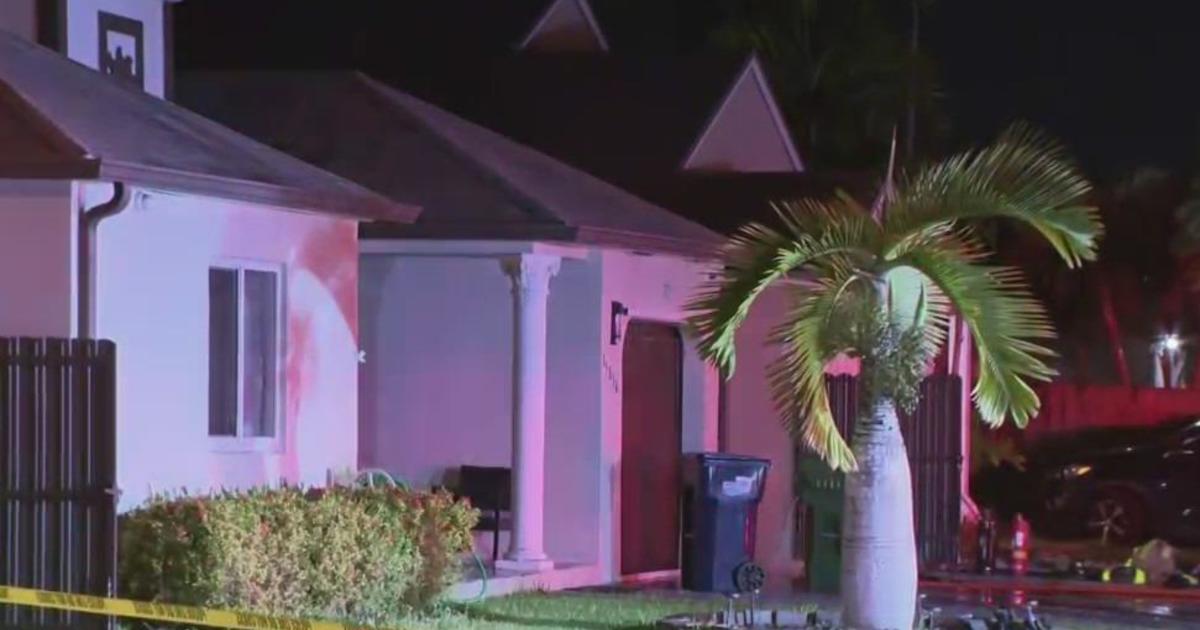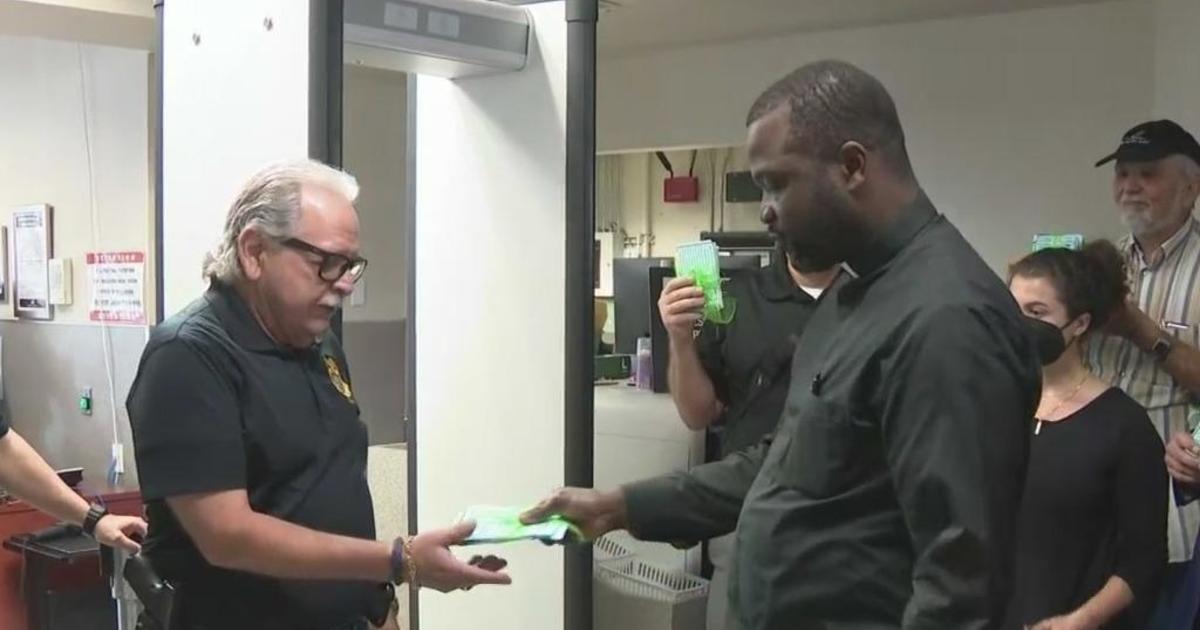Coronavirus Confusion: Miami Woman Allegedly Denied Proper Testing
MIAMI (CBSMiami) - In what may be the first case of coronavirus in South Florida, a woman who recently returned home from Italy says she was told by doctors at Jackson Memorial Hospital that she "likely" has COVID-19, but that they are unable to verify it because state and federal officials refused to conduct the necessary tests to confirm it.
"The doctor himself told me that, you know, he thinks that the results of my [preliminary] tests mean that I most likely have the COVID-19, but that the Department of Health did not want to pursue it further," said the woman, who requested that her name not be used to protect her privacy. "It was either the Department of Health or the CDC that decided not to further pursue the inquiry. But I was basically told that it is most likely that I have this virus and that I should self-quarantine."
"Obviously, I would have liked to know if, in fact, I have this virus."
A spokeswoman for Jackson Memorial Hospital wouldn't discuss the woman's case citing federal privacy laws, but said: "Jackson, like all other hospitals in the state, is following guidelines for testing established by the CDC and the Florida Department of Health."
The Florida Department of Health would not comment on the woman's case but in an email to CBS Miami, a spokesman for the agency "encourages" the woman to contact the health department. The email did not address the apparent confusion between Jackson and the state regarding who should be tested and when.
The woman's story highlights a serious flaw in how the United States has responded to the coronavirus. Until recently testing for the virus was limited to only an extremely small group of individuals who had travelled to China or those who were critically ill. As a result, health experts have warned, that the small number of people testing positive for the virus gives the public the false sense the virus has been contained or is limited in the United States.
"If you are not testing, then you don't know how many people actually have the virus," said Dr. Aileen Marty, an infectious disease expert at Florida International University. "And we have not been testing."
In the case of the Miami woman, she is still confused by what took place. She had spent a week in Northern Italy, just as the virus was spreading across that region.
"There was definitely a sense of doom and dread everywhere," she said
On Wednesday, February 26, afraid of being trapped in Italy, she flew home, stopping over in Madrid, before boarding an Iberian Airlines flight to Miami. She landed at Miami International Airport around 9 pm Wednesday.
"I started feeling a little bit sick leaving Italy on Wednesday morning," she said. "I was having a rather, severe sore throat and a headache and mild cough."
She said she was surprised there were no health officials meeting the plane to check on passengers. "There were no screenings at Madrid and there was there was no screening when I arrived in Miami," she recalled.
She said her cough grew progressively worse so she stayed home from work on Thursday and by Friday contacted her personal physician, who said she should go to Jackson Memorial Hospital to see if she had the coronavirus.
She said she called the hospital in advance and they recommended she wear a mask or some sort of covering over her mouth when she came to the hospital.
"And they immediately admitted me," she said. "Very quickly I was placed in a room. And they started diagnostic testing. Everybody who was coming into the room was very well protected with goggles and all the necessary protective gear."
It all felt so surreal, she took several pictures and sent them to her husband showing of the room she was held in and the healthcare workers in full protective gear.
After several hours, her doctor briefed her on what they had found.
"My preliminary tests came back rather alarming," she said, "because I tested positively for two strains of the previous coronavirus."
The current version of the coronavirus is known as COVID-19.
The woman shared with CBS Miami copies of her test results from Jackson showing she tested positive for earlier strains of the virus – coronavirus 229E and NL63.
She said her doctor told her that based on the results of her tests, the fact that she had been in Northern Italy during the outbreak of the virus, along with her symptoms, he felt confident she was positive for COVID-19. But they couldn't answer that question definitively without a test conducted by the CDC in Atlanta.
"I was just very confused," she said.
One of the reasons why they wouldn't do the test, the woman said, was that she was not considered in a high-risk category because she is in her 30s and otherwise healthy.
She said her doctor at Jackson, however, was still angry he couldn't get her samples tested
"The doctor said that there was basically nothing he could do," she said. "He was quite frustrated."
Instead, of leaving with answers she was sent home and told to stay in her house for 14 days.
"I was given masks," she said. "I was instructed to wear the masks. I was asked to self-quarantine. I was I was given a note not to go to work for a number of days. And that was pretty much it."
They did tell her that if her fever increases, her symptoms grow worse, or her oxygen levels drop she should return to the hospital.
Marty, the infectious disease specialist, reviewed the details of the woman's case along with the test results from Jackson. She did not see the woman in person or speak to her, nevertheless, based on her review of the case she agrees with Jackson's diagnosis.
"She probably does have COVID-19," Marty said. "The fact that we are not testing, unless somebody is severe or critical, is basically a problem because we are missing 80 percent of cases."
Marty was also concerned no one tried to conduct an epidemiological study – a review of who this woman came into contact, including what flight she was on and who else might have the virus as a result.
"All those contacts absolutely have to be traced if we are going to try and contain this virus," said Marty, who worked for the World Health Organization in Africa to help curb the spread of Ebola.
Marty said she understood the frustration of the doctors at Jackson over more not being done in this case.
"I also would have been angry and annoyed, in fact even furious," she said. "Because it doesn't allow me to treat my patient in the ideal way. And one of the things that every patient wants to know is what is wrong with me."
The woman now under self-quarantine agrees: "I think it's naive to think that we are not going to see any cases here that we have this contained. I mean, there are hundreds of people pouring in every day from all over the world. We need to have the proper testing measures available."
And she notes, her husband is now sick.
"But we're both doing okay," she said. "He's staying on with me. So we've stocked up on supplies. So, you know, I'm not so worried. We're both monitoring symptoms and we're doing OK."



